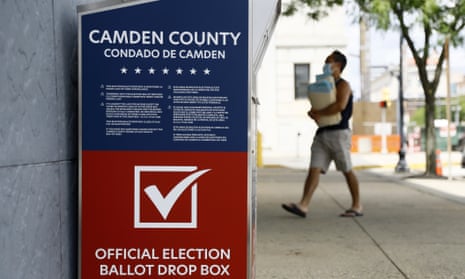Last year, about 102,000 New Jersey residents were barred from voting due to felony convictions, according to a report from the New Jersey Institute for Social Justice. And the problem was accelerating: about 2,500 residents saw their names purged from the state’s voting rolls due to felony conviction each year between 2016 and the end of 2018.
Advocates reversed that trend in late 2019, successfully organizing for the passage of A5823, a bill that restored ballot access for all people on parole or probation in New Jersey, processes that can last years after people leave prison. When the new law took effect on 17 March, about 83,000 people recovered their voting rights, a figure roughly equivalent to the population of Trenton, New Jersey’s capital city.
But after losing months of potential canvassing and registration drives because of the coronavirus pandemic, advocates struggled to inform those tens of thousands of people about their restored voting rights and encourage them to register in advance of today’s primary election. (New Jersey enforces a voter registration deadline of 21 days in advance of each election.)
Some parole and probation officers have notified people under their supervision of their restored voting rights, said Henal Patel, director of the Democracy and Justice Program at the New Jersey Institute for Social Justice. But it’s unclear to what extent the agencies responsible for administering parole and probation have participated in the notification effort.
Sixty-two-year-old Ronald Pierce has been on parole since 2016 after spending 30 years in New Jersey state prisons. Pierce, who grew up in a public housing project in Bayonne, New Jersey, recalled that his large working-class family valued political participation and the local Democratic party. Pierce told me he voted in every general election and Democratic primary in New Jersey from when he turned 18 in 1976 until the time of his arrest in 1986.
While being held at Trenton state prison after receiving a life sentence in 1987, Pierce received a letter informing him that his voting rights had been suspended. “Getting that letter buckled my knees,” he recalled. “It made me feel really disconnected, not only from society itself, but also from my family and my father.” While incarcerated, Pierce pursued a bachelor’s degree through NJ-Step, a program administered jointly by Rutgers University-Newark and state correctional institutions. Pierce paroled out of prison in 2016.
Testifying before a state senate committee in January 2019, Pierce said, “I look forward to the day when I can again walk proudly into a voting booth.” A little over a year later, in March 2020, Pierce registered to vote at Bethany Baptist church in Newark. “It was surreal,” he said.
In the context of the coronavirus shutdown, Patel said, libraries and other public offices (like departments of motor vehicles) are closed or operating with reduced hours, limiting people’s ability to access voter registration materials.
But even if people like Pierce can register, the law leaves many people who have gone through the mass incarceration system out – especially minority voters. Patel pointed out that while A5823 was a tremendous victory, the new law won’t solve the racial disparities. Black prisoners are statistically less likely to be released on parole or to receive probation sentences in place of jail time, which means tens of thousands of people with felony convictions still won’t be able to vote.
“We’re going to keep pushing until we have full restoration,” Patel said.
Both Patel and Pierce said that their work is far from finished. They see their real objective as restoring true universal suffrage to New Jersey. Today’s election could be the first step.
“I often tell those who I was incarcerated with, who are still imprisoned, that I will not forget about them, and I will fight for them,” Pierce testified before a state senate committee last year. “This is what I stand up for: the rights of those not only silenced, but buried beyond visibility.”
